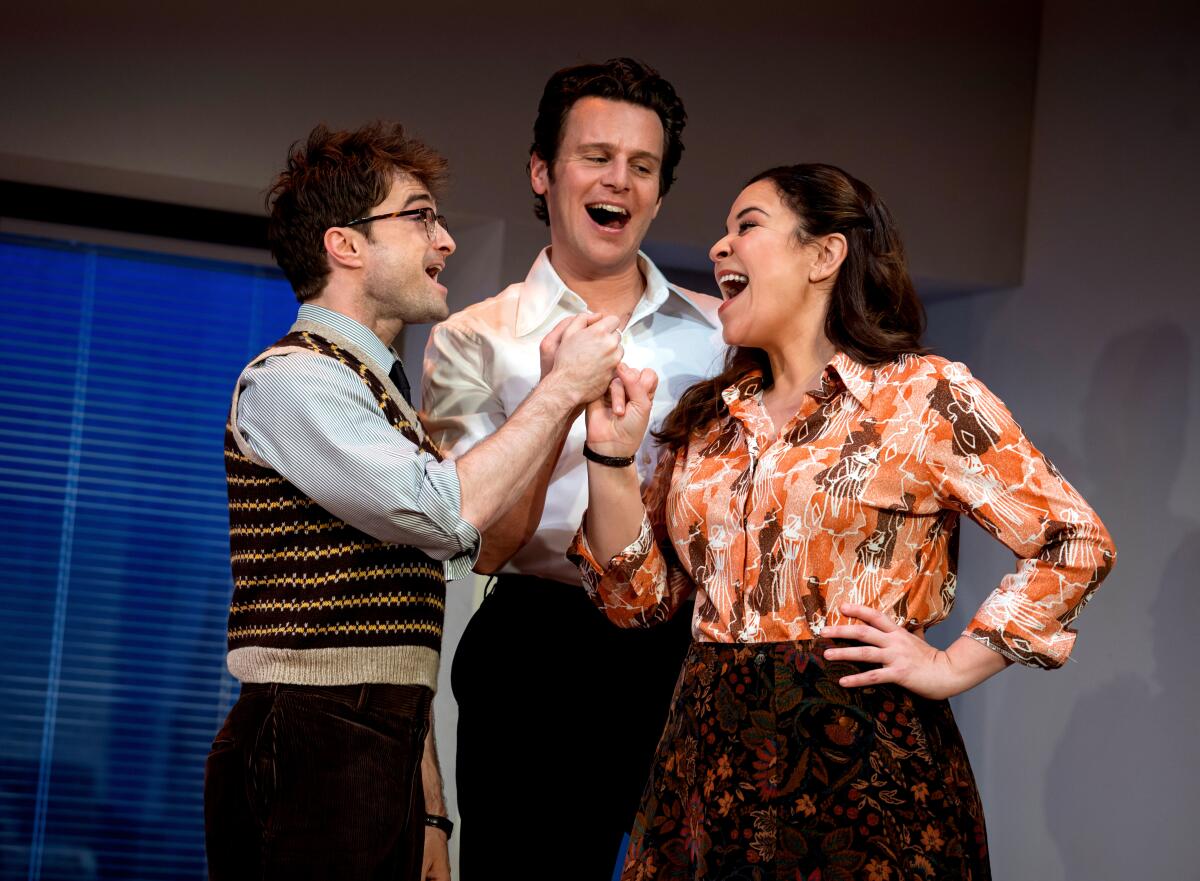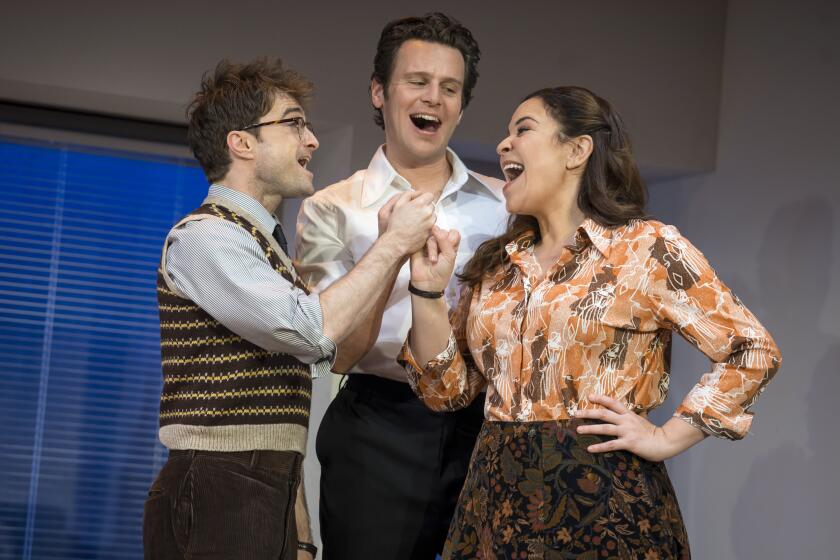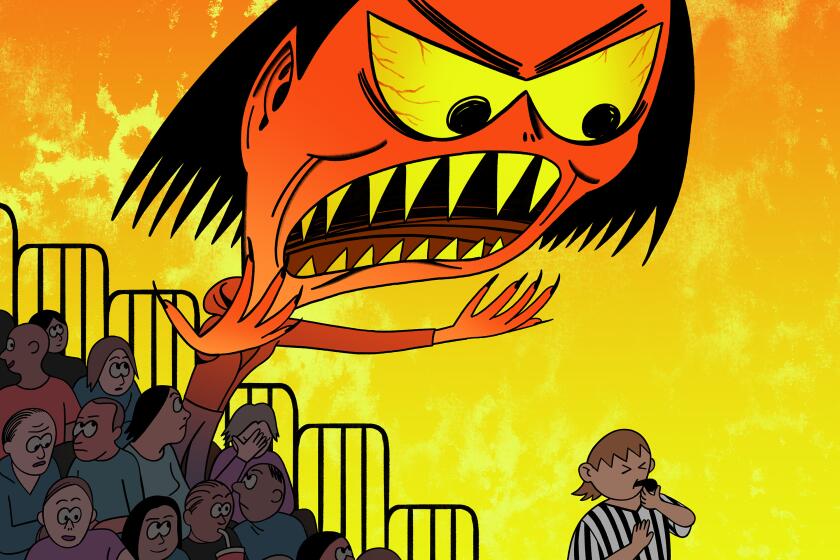Hollywood made friendship another unrealistic ideal. A Broadway hit finally smacks it down

In the first act of “Merrily We Roll Along,” the Stephen Sondheim/George Furth musical currently enjoying a successful Broadway revival, the three main characters sing about the role old friends play in our lives. “Good friends,” argues Frank (Jonathan Groff) “point out your lies, Whereas old friends live and let live.” “Good friends like and advise,” agrees Mary (Lindsay Mendez). “Whereas old friends love and forgive.”
Charley (Daniel Radcliffe) also believes in the unique power of long-lasting friendship, but for him it serves another purpose — to remind each friend of who they truly are, or should be, even if they disagree.
And therein lies the crux, and the tension of the show. Based on a play by George S. Kaufman and Moss Hart, it is a reverse chronology of how a long, loving and fruitful friendship among three artists — Frank is a composer, Charley a lyricist and Mary a novelist — fell apart.
Spoiler alert: Hollywood is to blame. (I did mention that the show was on Broadway.)
Well, not Hollywood so much as success. Or a certain type of success. When the show opens, Frank is a big Hollywood producer being feted at his big Hollywood home. Mary is there, taking hilarious and increasingly drunken shots at the shallowness of the crowd (Kaufman and Hart were said to have based her on Dorothy Parker), but when Charley’s name is mentioned Frank freezes. Years earlier, he and Charley created several successful Broadway hits; Charley is still writing plays but now they do not speak.
The personal cost of high-flying success is a ubiquitous theme in human storytelling, from Greek mythology (hello, Icarus) to “Succession.” But “Merrily” is mostly about friendship — Charley tries to keep Frank true to his musical genius and youthful ideals despite Frank’s obvious desire to chase money, power and glamour, and Mary bounces between them, desperate to protect the relationship itself.
More indelible than the pleasures of its performances or score, more incisive than its familiar assurance that being a rich Hollywood producer is, in fact, the worst, is “Merrily’s” willingness to take a complicated view of friendship.
Frank’s and Charley’s very different definitions of what constitutes a friend offer an astringent alternative to our culture’s sometimes treacly, overly simplistic portrayal of the bond. Even more than Broadway, Hollywood has fetishized friendship to the point that it’s hard not to feel like a failure if, decades later, you are not still devoted to every person you met in your teens or 20s .
The Broadway revival of ‘Into the Woods’ and the new off-Broadway revival of ‘Merrily We Roll Along’ bring new life to challenging Stephen Sondheim musicals.
Romantic love may remain our most popular narrative, but adult friendship has become a very close second. Blocks away from New York’s Theater District one can bask in the glories and re-created sets of “The Friends Experience,” take the “Sex and the City” tour or (if you’re up for a subway ride) have lunch in “Seinfeld’s” Tom’s Restaurant.
These shows, and their more contemporary counterparts like “New Girl,” “Insecure” and even “Girls,” offer a very different version of friendship from “Merrily.” Following in the footsteps of “The Big Chill” and “St. Elmo’s Fire,” they project an image of unbreakable bonds formed during early adulthood that is every bit as romantic as any “happily ever after” love story.
Even as subsequent generations grapple with the increasingly digital nature of friendships (is a follower a friend?), our cultural narrative comes down hard on the belief that real friends are friends forever.
I am not saying long-term friendship isn’t something to celebrate — I saw “Merrily” with a beloved friend I have known for 40 years and with whom my 17-year-old daughter and I were staying for the week. (That’s friendship.)
I’m just saying that mythologizing it sets an exceptionally high bar. Not all friendships go the distance, which doesn’t make them less valuable, and the ones that do often take all sorts of work.
The show’s musical debate about the nature of “Old Friends” raised issues most of us have had to deal with, often without quite having the language. What does real friendship require? Time? Proximity? Ever-aligned hopes and dreams?
“I’ll be there for you” is a lovely sentiment, but what does that actually look like? Supporting your friend in every decision or calling them out when you believe they are making a bad one?
Shared memories cast a powerful spell, but sometimes a divergent path can be seen as betrayal, especially for relationships formed when we are young. What is the ratio of expectation and forgiveness that keeps a friendship alive and vital? How does that change as we age and grow?
After three kids’ and 20 years’ worth of youth sports, columnist Mary McNamara reflects on the real reason parents yell at the refs and other lessons she’s learned along the way.
My daughter and I glanced at each other when “Merrily’s” characters name-checked the schools they were either still attending or had just left — Juilliard, Columbia, Barnard. We were in New York to tour some colleges, which meant, among many other things, that my daughter was contemplating a time when she would leave not only her family but the very close friend group she has had since elementary school. Indeed, the first comment she made about whichever campus we visited was whether or not the students seemed friendly. (I did try to point out that friendliness can be expressed … differently in New York than it is in L.A.)
Soon she will be faced with the pressure that distance, and maturation, can put on youthful friendships, while exploring new ones with all the wonder and pitfalls that inevitably involves.
I hope that she will continue to surround herself with the kind of people who help you launch into the world and stay with you for the entire ride. The kind of friend who, after 40 years, will put you and your child up for a week and accompany you to a Broadway musical that she has already seen because she wants to see it with you.
But, as I have told her and all my kids, “Friends” is a television show — most people don’t hang out exclusively with the same small group for 10 years, just as most young adults can’t afford big apartments with exposed brick walls. And that’s OK.
Circumstances change — people pair off, have children, choose lives that seem at odds with the dreams of youth.
In “Merrily,” Frank is positioned as the “villain” of the piece — in his pursuit of fame, and money, he has betrayed two marriages as well as neglecting the central friendship. But Charley‘s insistence that he remain the same young man he met when they were both poor and struggling, and Mary’s increasingly desperate need for the friendship to endure no matter what, is just as problematic.
More than just about anything, love of any kind requires much forgiveness and not all “truth-telling” is about telling the truth.
The expectation that friendship can always, and magically, transcend everything, that we will always be cushioned by a group of forever friends, can create as much anxiety as friendship is supposed to relieve.
Sometimes friendships break or simply fade. Not all bonds survive the test of time or change, and even the best friendships can go through fallow periods. People don’t have to live in each other’s pockets to avoid being alone, and being alone is not always a bad thing.
Friends are glorious creatures, people we love without the formal commitments of family or marriage but because we just do. There is no formula for enduring friendship beyond the desire and willingness to keep it alive and healthy. Like any type of love, you just know it when you feel it. And when you keep on feeling it.
No matter what.













